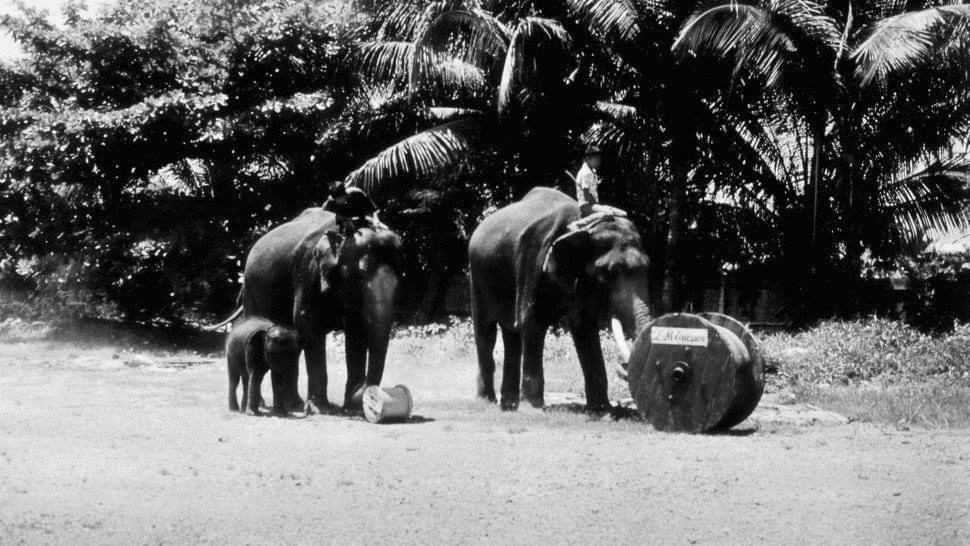Country Manager Nadine Allen envisions Ericsson’s new partnership with dtac as an essential step towards the country’s 5G future
On October 29, 2019, Ericsson and dtac announced a partnership where Ericsson would manage dtac’s network operations. On that day, Ericsson (Thailand) country manager Nadine Allen spoke to hundreds of dtac employees who would transfer to Ericsson under the terms of the partnership. And while change always causes anxiety, there was palpable relief when Ms. Allen shared that Ericsson has been a telecoms leader in Thailand for over 100 years—and has equally bold plans for the decades ahead.
FROM ELEPHANTS TO 5G
While 30-year-old dtac is no newbie to mobile networks, Ericsson’s history stretches all the way back to King Rama V. It was after a visit to Sweden that he tasked Ericsson with setting up the first telephone network in Thailand, at a time when giant spools of phone lines were pushed by elephants and field technicians wore pith helmets instead of hard hats.

“Most people don’t realize that Ericsson has been here for 114 years,” Ms. Allen told us in a boardroom overlooking Vibhavadi Rangsit Road, where Ericsson is now located. “There’s a very long-lasting bond between the Swedish and Thai royal families. Ericsson brought the very first phone lines, here, and was first to bring 1G, 2G and 3G. These technologies revolutionized how Thai society operates.”
Indeed, Thais are topping social media usage, be it in terms of Facebook users in Bangkok or daily hours watched on YouTube. To keep up with data consumption nearly doubling each year, Ericsson and dtac rolled out thousands of new 4G base stations in 2019.
“I’m very proud of our contributions. And I’m very excited about what comes next,” she said. “5G is around the corner and it will be a strong driver of Industry 4.0. 5G will be fundamental to realizing that ambition.”
Ericsson is already a global force in 5G, with 5G launches in the US, Korea and Switzerland. The company was also first to demonstrate the technology in Thailand in 2017. In late 2019, at dtac’s in-house café, they even set up a fully functioning use case for mobile broadband, providing Wi-Fi via a 5G router.
“For 5G to happen in Thailand, of course we need spectrum. But we also need to ask, ‘What are we going to do with the technology?’” Ms. Allen said. “For one, there’s an interesting customer proposition. In South Korea, they’ve really augmented their consumer offering with many partnerships, particularly in gaming, virtual and augmented reality offer. And then there’s fixed wireless access, which could have great potential for dtac to provide an alternative to fiber or fixed line access. And thirdly, there are enterprise solutions.’”
PEOPLE POWER
With 24,000 people in research and development, Ericsson is uniquely positioned to tackle the technological challenges of a 5G rollout, both in terms of equipment manufacturer, and training its teams to operate increasingly complex networks.
“From a technology perspective, the transition to 5G can evolve seamlessly. Since 2015, the equipment we ship has been 5G compatible,” said Ms. Allen. “It shouldn’t be difficult provided the spectrum is provided in a timely and affordable manner.”
From a human perspective, the dtac partnership triples Ericsson’s current headcount. But Ms. Allen is confident that too can be a seamless transition.
“It’s very exciting to welcome our new colleagues. I’m very happy about that. In fact, I was managing about 1,000 people in our managed services division in the UK. And I strongly believe that what any organization needs most is trust and respect. We will fully welcome and fully integrate our new colleagues.”
Ms. Allen also stressed that the bonds to dtac must remain as tight as ever: “5G is a journey and we’ll need a lot of trust and cooperation as we learn about it together. dtac is now in a really good position with its 2300 MHz spectrum. Rolling out those 2300 MHz sites at record speeds showed how the whole organization can really mobilize and perform when needed. That instinct will always be there, at dtac, and it will be very important for 5G.”

Equipment is far from the sole focus of this partnership, though. The dtac teams joining Ericsson will be performing what’s called “managed services,” operating dtac’s network as Ericsson, although under the operator’s strategic guidance. Managed services bring an inherent efficiency, along with higher performance for customers. But Ms. Allen also stressed that for such partnerships to work, there are intangibles that must be considered.
“In the past, outsourcing was only about efficiency. But we would have been concerned if dtac were only interested in that. Thankfully, our visions are also fully aligned. We want to be obsessively customer-centric, using metrics that genuinely reflect the user experience,” she said.
As networks become increasingly complex, it is becoming more common for network operators to entrust their operations to global communications technology specialists with advanced solutions such as AI and automation. With 5G comes network slicing, new device types and new use cases. It’s important for dtac to be assured those technological challenges are in good hands, while it focuses on turning these opportunities into sustainable opportunities for its customers.

